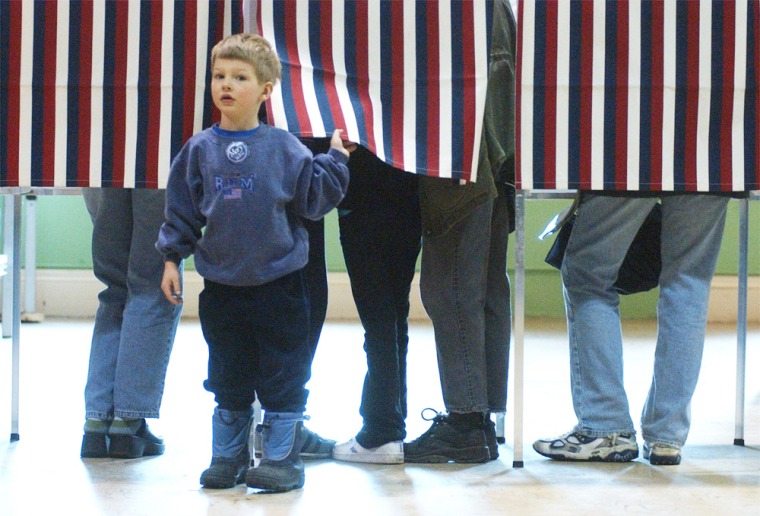Democratic voters on Super Tuesday were anxious about the economy, critical of foreign trade and very focused on beating President Bush in November, according to NBC News exit polls.
About a third of the voters in Super Tuesday states said the economy and jobs were the top issues in the election, far outpacing other issues such as health care and the war with Iraq, according to exit polls conducted Tuesday for The Associated Press. A majority of voters, about six in 10, said they were convinced foreign trade is more likely to take jobs from their states, while only two in 10 said they thought foreign trade would add jobs in their states.
The Democratic candidates talked a great deal about trade and jobs in the last week, especially after John Edwards made it a centerpiece of his campaign. John Kerry responded by talking about steps he would take to make trade agreements more fair.
The exit polls were conducted in California, Connecticut, Georgia, Maryland, Massachusetts, New York, Ohio, Rhode Island and Vermont. Caucuses were held Tuesday in Minnesota, but no exit poll was conducted there.
Job No. 1: Beat Bush
About a third of all voters in the Super Tuesday states put the highest priority on a candidate’s ability to beat Bush. Other qualities viewed as important by voters in earlier primaries and caucuses did not fare as well, such as a candidate who cares about people like them and a candidate who stands up for what he believes.
Economic concerns were also reflected in the way people viewed their own financial situations. Almost four in 10 said they were worse off financially than they were four years ago, and almost that many said their financial situation was about the same.
As they have in previous contests, most Democratic voters were either angry or dissatisfied with Bush.
About half of voters in the Super Tuesday primaries said they were angry at the president and another third said they were dissatisfied with him, according to exit polls conducted for NBC News, The AP and the TV networks by Edison Media Research and Mitofsky International.
Varied ideological makeup
The voters’ ideological makeup was very different in the states that voted Tuesday, with more than half of voters in the northeastern states like Connecticut, Vermont and New York describing themselves as liberal, along with a majority in California.
In Georgia and Ohio, about four in 10 said they were liberal and almost half in Massachusetts and Maryland described themselves that way.
About a quarter of the voters said they once planned to vote for Howard Dean, the former Vermont governor who was front-runner through much of the last year.
Most people — about six in 10 voters — made up their minds about whom to vote for more than a week ago.
Kerry? Edwards? Either
Four in five of the Super Tuesday voters said they would be satisfied if Kerry was the nominee, while almost six in 10 said they would be satisfied if Edwards was the nominee.
The exit polls showed very different opinions about gay marriage among the Democratic primary voters, depending on the state. Almost four in 10 of all voters said they thought gay couples should be allowed to legally marry, three in 10 said they should be allowed to form civil unions but not marry, while almost that many said there should be no legal recognition of gay couples.
Almost half in California and Vermont said they thought gay couples should be allowed to marry, while about one in six felt that way in Georgia.
Voters were surveyed as they left precincts Tuesday, with the number interviewed ranging from 596 in Rhode Island to 1,489 in Maryland.
